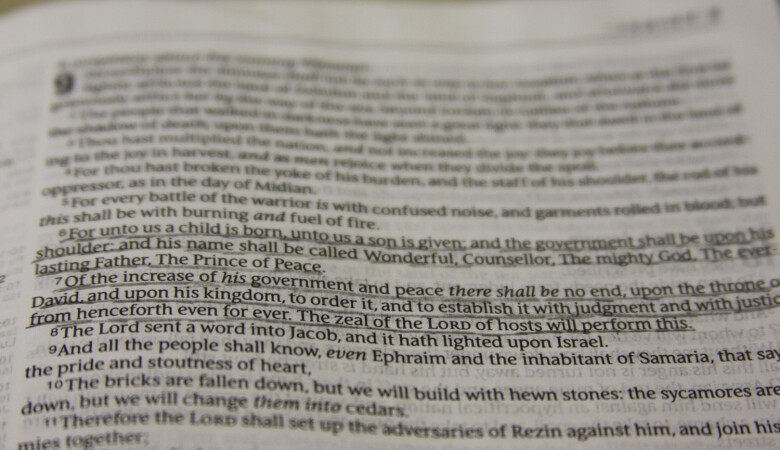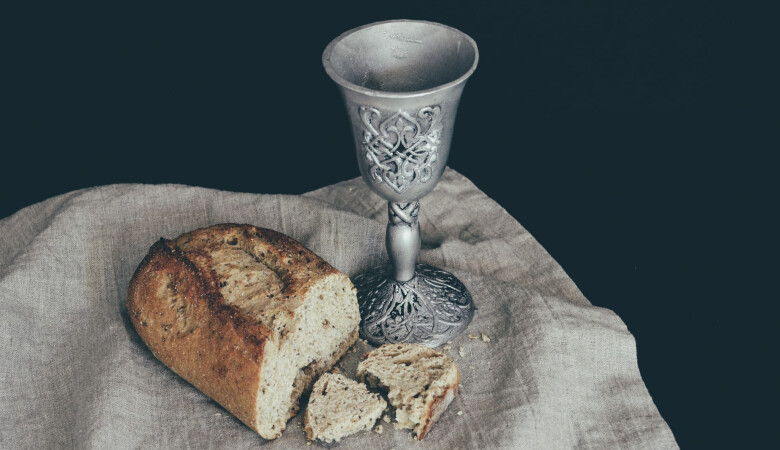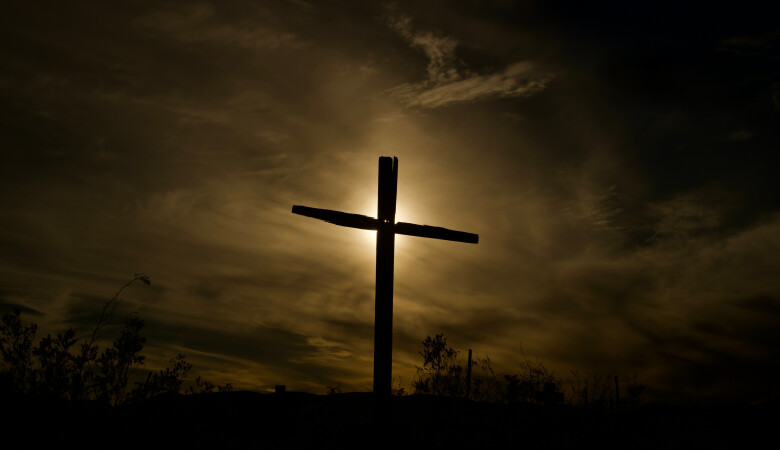Series: Easter Sermons
Christ Forsaken by God So We Could Be Eternally Welcomed by God
March 29, 2024 | Andy Davis
Psalms 22:1-31
Prophecy, Atonement
Psalm 22 is a prophecy ordained by God and explains in great detail the death of his Only Begotten Son for the sins of the world.
- SERMON TRANSCRIPT -
Turn in your Bibles to Psalm 22. We're going to meditate on the words of this psalm. As I was thinking about the centerpiece, for me, the most important aspect of this and why it is we're contemplating Psalm 22, the statement Jesus made from the cross, "My God, my God, why have you forsaken me?" My mind earlier this week was led to consider the parable of the prodigal son. I felt led by the Spirit to think about that. I wasn't actually even directly thinking about Good Friday or even Psalm 22, but I was just thinking about this parable. In that most moving and personal of all of Jesus's parables, perhaps the most famous, Jesus speaks of a sinful, selfish, rebellious son who is discontent in his father's household and demands his share of the father's estate and then goes away from his father and squanderers all of that money in riotous and wicked living. He's gone for years. He seems to be never thinking about his father or the grief that he has brought to him.
Finally, a famine comes in the land. He runs out of all of his money. He is starving and finds a job feeding pigs, and he begins to think about the living conditions back in his father's estate and how the servants there are far better off than he was in that condition. There, the servants are fed better than this. They're clothed better than this. They're just cared for better than this. He decides that he's going to go back and ask his father's permission to live as a servant on his father's estate, and so he sets out.
But in the parable, while he is still a far way off, his father sees him and comes running almost certainly with tears streaming down his face. We can imagine this is the moment he's been yearning for for years. He embraces his son with a fervent hug. The son confesses his sin and asks to live in the servant's quarters, but the father won't hear of any of that. He wants a rich robe put on his son. He wants a ring on his finger. He wants shoes on his feet. He wants to kill the fatted calf and have a feast for his son to celebrate. "My son was lost and is found. He's dead and is alive."
It's a dramatic story of forgiveness and of a rich welcome by a perfectly loving father. Now, of course, the prodigal represents all sinners in all countries across all time, and the father of course represents God. But as beautiful as that story is, as I pondered it earlier this week, I realized there was a significant figure missing from the parable, and that's Jesus. And more especially the atonement. It's not there in the parable. It doesn't mean that the parable is in any way defective. Parables just teach a specific aspect of truth. But the atonement is missing. Jesus is missing. The bloodshed on the cross is missing.
The word atonement means “at one ment.” The biblical word, also reconciliation, forgiveness of sins. So the question came in my mind, on what basis does the father welcome the prodigal son back and give him such a rich welcome? Who pays for that man's sins, his violation of their love relationship, his squandering of the family wealth on sinful living? Who pays the price for the happy feast? And that's where in my mind Psalm 22 comes in. The central idea for me is that through the indescribable, infinite, immeasurable suffering of Jesus on our behalf, our sins are forgiven. Or more related to the prodigal son, Jesus was forsaken by God to purchase for us a rich welcome from God.
"Through the indescribable, infinite, immeasurable suffering of Jesus on our behalf, our sins are forgiven. Or more related to the prodigal son, Jesus was forsaken by God to purchase for us a rich welcome from God."
When Jesus cried out, "My God, my God, why have you forsaken me?", this was Him paying for our sins on the cross. In this, He worked a perfect atonement for all who believe in Him. Ephesians 1:7, "In him, we have redemption through his blood, the forgiveness of sins in accordance with the riches of God's grace." This pays for the rich welcome. We have by faith already received the moment we came to faith in Christ, all of our sins forgiven, and that we expect to receive when it lasts. We see God face to face. He was forsaken by God to purchase for us an infinitely and eternally warm welcome from God. That's what we're going to walk through as we look at Psalm 22.
Psalm 22 is a miracle really, a supernatural prophecy written by King David, a Jewish king, a thousand years before Jesus. We Christians believe in the miracle of prophecy, that the spirit of God could be in a man like David writing words that he did not understand, words that would be fulfilled ten centuries later. There may have been some connection to something going on in David's life. He had some very rough times in his life, no doubt. But any way, that Psalm 22 might be talking about David's experience is somewhat like the dim light of a star that is completely obliterated by the brightness of the sun shining at full strength, and that's Jesus. Christ is that brilliant light. And to me, ultimately Psalm 22 is about Him.
The Apostle Peter gives us the right understanding of the miracle of prophecy in 1 Peter 1:10-12, "Concerning the salvation, the prophets who spoke of the grace that was to come to you searched intently and with the greatest care trying to find out the time and circumstances to which the spirit of Christ in them was pointing when he predicted the sufferings of Christ and the glories that would follow."
Sometime ago, I noticed that was a great two-part outline to Psalm 22, the sufferings of Christ and the glories that would follow. We continue in 1 Peter, "It was revealed to them, the prophets, that they were not serving themselves, but you when they spoke of the things that have now been told you by those who have preached the gospel to you by the Holy Spirit sent from heaven. Even angels long to look into these things." Peter's saying the prophets searched out and tried to understand their own words and didn't fully arrive at it. The angels in time, as things unfolded, were longing to try to understand what God had planned. In other words, the prophets were not writing for themselves or ultimately about themselves, but for a later generation. The spirit of Christ was in them, lifting them above time because God is eternal and moving the prophets concerning what they wrote. The theme here in Psalm 22 is the sufferings of Christ and the subsequent glories, the glories that would follow.
I. The Sufferings of Christ
Let's look first at verses 1-21, the sufferings of Christ. It begins with these stunning words, "My God, my God, why have you forsaken me?” Jesus spoke those words from the cross. The gospel writers tell us even what Christ's words sounded like. Mark 15:34, "At the 9th hour, Jesus cried out in a loud voice, 'Eloi, Eloi, lama sabachthani?’, which means "My God, my God, why have you forsaken me?"
This week I got out my Japanese Bible, I was a missionary for two years in Japan, and I found, sure enough, they transliterated "Eloi, Eloi, lama sabachthani" into the Japanese writing. So it is in the translations all over the world, mystically, mysteriously the Holy Spirit wants us to hear the sounds. It's almost like opening up a time capsule and some aroma comes wafting out from another time, like we're transported when we hear the actual syllables. It's that important. Why did He cry this? First, because He was experiencing this at an almost inconceivably deep level as He was dying on the cross for our sins. Jesus was our sin bearer, our substitute. The sufferings He experienced were in our place as we heard earlier in Isaiah 53, "He was pierced for our transgressions. He was crushed for our iniquities. The punishment that brought us peace was upon Him. And by his wounds, we are healed. We all, like sheep, have gone astray. Each of us has turned to His own way and the Lord has laid on Him the iniquity of us all."
If you don't understand that transfer of guilt onto Jesus' substitute, you will not understand the cross or Christianity. God the Father transferred our guilt to Jesus so He experienced effectively hell on the cross so we would be delivered from God's wrath for all eternity. The cry expresses what I consider to be the worst part of hell— to be utterly and completely forsaken by God. In hell, God exists. God is there, God is present only to sustain the place. The worm does not die and the fire is not quenched because God makes sure that that happens. But He's not there to bless any of its inhabitants, they are forsaken.
Jesus experienced total and complete forsakenness, alienation from God on the cross. God had turned His face away. Then the Psalm extends the sufferings to continue in verse 1, "Why are you so far from saving me? So far from the words of my groaning? Oh my God, I cry out by day, but you do not answer, by night, and I'm not silent." As though Jesus as our substitute knows that no matter what He cries out to God in that condition, God will not answer Him.
This is a direct contrast to the godly forefathers that are mentioned next in the Psalm, verse 3-5, ”Yet you, God, are enthroned as the holy one. You are the praise of Israel. In you, our fathers put their trust. They trusted and you deliver them. They cried to you and were saved. In you, they trusted and were not disappointed." The Psalm acknowledges that in the past, God, the holy one, enthroned by the praise of Israel, was the focus of their trust and their prayers. God answered them and intervened for them and delivered them, but not Jesus. Not Jesus. He says, "But I am a worm and a man. I'm the lowest of the low, like a worm crawling on the ground, easily trampled, readily crushed, openly despised and hated." So the verse continues, verse 6, "Scorned by men, despised by the people."
The psalm actually predicts the words that the inhabitants, the citizens of Jerusalem, would say while Jesus was dying. Verse 7-8, "All who see me mock me. They hurl insults, shaking their heads. He trusting in the Lord. Let the Lord rescue Him. Let him deliver Him since he delights in Him." All you have to do is read the gospel accounts. You'll see effectively those exact same words. That's what the people were saying that terrible day. And while they were mocking Him, Jesus was thinking about His entire life of perfect faithfulness to God, making that the basis of His prayer to God. Verse 9 through 11, "Yet you brought me out of the womb. You made me trust in you even at my mother's breast. From birth, I was cast upon you. From my mother's womb, you have been my God. Do not be far from me, for trouble is near and there's no one to help."
No one in history have those words been so true for as concerning Jesus. Who had the level of intimacy with God that Jesus had before this moment on the cross? Who immersed himself in a life of prayer and walked moment by moment in a right relationship with God like Jesus? And now here on the cross, that's gone. It's gone.
Verses 12-18 of the Psalm, written by David a thousand years before Christ, give astonishing details about the actual crucifixion. If you read the gospels, Matthew, Mark, Luke, and John, they're noticeably restrained concerning these details. It just says they crucified him. That's it. It doesn't describe any of the mechanics of it. The closest you'll get in all the Bible of what it's actually like to be crucified is amazingly in Psalm 22, a thousand years before Jesus was born.
First, surrounded by powerful enemies like the Roman soldiers who were crucifying Him and the Jewish leaders who hated him. Verse 12-13, "Many bulls surround me, strong bulls of Bashan encircle me, roaring lions tearing their prey, open wide their mouths against me."
Second, the dehydration and the disfigurement of the body while hanging on the cross, verses 14- 15, "And I'm poured out like water and all my are out of joint. My heart has turned to wax. It has melted away within me. My strength is dried up like a pot shirt and my tongue sticks to the roof of my mouth. You lay me in the dust of death."
Then third, the most stunningly, the actual piercing of hands and feet, "Dogs have surrounded me," verse 16, "a band of evil men has encircled me. They have pierced my hands and my feet." Stop. Ponder this. This is not talking about David. The spirit of God lifted him up above whatever his immediate circumstances were and put these words in His mind. This is a clear prophecy of crucifixion. And yet crucifixion would not be invented for another half millennia at least after David wrote these words.
Fourth, the disfigurement of the body in front of gawking hostile people. Verse 17, "I can count all my bones, people staring gloat over me." Then finally, the tiny little detail of the gambling over Jesus' clothes, which is cited clearly in John 19, "They divide my garments among them and cast lots for my clothing,” fulfilled by the Roman soldiers. They were not trying to fulfill Psalm 22. They didn't know about Psalm 22. They just didn't want to tear his white robe and decided to gamble for it by casting lots, fulfilling this prophecy.
Then the section ends in Jesus' prayer for deliverance, verses 19-21, "But you, oh Lord, be not far off. Oh, my strength, come quickly to help me. Deliver my life from the sword, my precious life from the power of the dogs. Rescue me from the mouth of lions. Save me from the horns of the wild oxen.” This is a more elaborate prayer than the one Jesus prayed right before He died, saying, "Father, into your hands, I commit my spirit,” expecting to be raised from the grave. Verses 19-21 is effectively that prayer. There's no way to read, for me anyway, Psalm 22 without seeing supernatural power at work in this prophecy, explaining in great detail the death of Jesus, the only-begotten son of God a thousand years before He was born.
"There's no way to read, for me anyway, Psalm 22 without seeing supernatural power at work in this prophecy, explaining in great detail the death of Jesus, the only-begotten son of God a thousand years before He was born."
II. The Glories That Followed
Then the good stuff, the subsequent glories. Jesus did all of this for the joy that was set before him. The tone of Psalm 22 changes radically beginning at verse 22 up through the end, verse 31, the glories that followed.
First, declaring God's name to his brothers, verse 22, "I will declare your name to my brothers in the congregation. I will praise you,” directly quoted in Hebrews 2, referring to Jesus. After his resurrection, He tells Mary Magdalene to go tell the brothers. He's getting the men together. They're not expecting a resurrection, not at all, but He goes there and declares God's name to them. What does that mean? The triumph of God over the grave. The triumph, the greatness of Almighty God on display in the person of His resurrected son. "I will declare your name to my brothers in the congregation. I will praise you."
Next, He summons His own people, the Jewish people. This is strongly Jewish language, and He's speaking to the Jewish nation here in verses 23-26, "You who fear the Lord, praise Him. All you descendants of Jacob, honor Him. Revere Him all you descendants of Israel, for He has not despised or disdain the sufferings of the afflicted one. He has not hidden his face from Him, but has listened to his cry for help. From you comes the theme of my praise in the great assembly. Before those who fear you, I will fulfill my vows. The poor will eat and be satisfied. They who seek the Lord will praise Him. May your heart live forever."
Praise God, honor God, revere God. This is celebration; that's the call here. The language seems to be the language of a feast, hence the prodigal son and the idea of killing the fatted calf. This is an eternal feast of worship in heaven. There's eating language, "Come and eat and be satisfied richly." Then I love that promise of eternal life, "May your hearts live forever.” Brothers and sisters, isn't that a great thing to say to each other? "May your heart live forever." It's kind of an interesting phrase. When was the last time you said that to anyone? "May your heart live forever." It's resurrection language. But it's not just the Jewish nation, not at all. God's plans are bigger than that.
From the moment He called Abraham, His desire was through Abraham and through his offspring that all peoples on earth will be blessed. This is mission language. Look at verse 27-28, "All the ends of the earth will remember and turn to the Lord. And all the families of the nations will bow down before Him, for dominion belongs to the Lord and He rules over the nations.” This is a message that's going to go out to the ends of the earth. Let me tell you something, there’s no piercing of literally David's hands and feet that blessed all the nations of the earth. Not at all. This is Jesus, only Jesus. And not only all nations, not only all ethnic groups, but the rich and the poor, the dead and the living alike. Verse 29, "All the rich of the earth will feast," there's that feast language, "and worship. All who go down to the dust will kneel before Him. Those who cannot keep themselves alive." This message of joy in the face of death will extend to all generations. Verses 30-31, "Posterity will serve him. Future generations will be told about the Lord. They will proclaim His righteousness to a people yet unborn for he has done it." That's us, everyone. You weren't born when David wrote these words, no matter how old you are. People yet unborn have heard, and that's you and me. For he has done it. It reminds me of Jesus' words, "It is finished." He's done it. This is his work.
So dear friends, looking at this amazing prophecy in Psalm 22, we reflect on the sufferings of Christ. And we do so with reverence, with a clear awareness that it is our sins that put Him there on the cross. But then as we look at the glories that follow, we see the immense power of the work of Christ in bringing us to an eternal banquet of praise that will feast at for all time. Close with me in prayer.
Father, we thank you for the power of the Word of God. Apart from scripture, we know nothing, literally nothing about Jesus. But the scripture's testimony to Jesus started long before He was ever born. I thank you for the miracle of prophecy. Thank you for Psalm 22. But more than anything, I just thank you Lord Jesus for drinking that cup of wrath for me, for being willing to be forsaken by God so I would be richly welcomed by my father into an eternal banquet in heaven. In your name, Lord Jesus, I pray. Amen.































